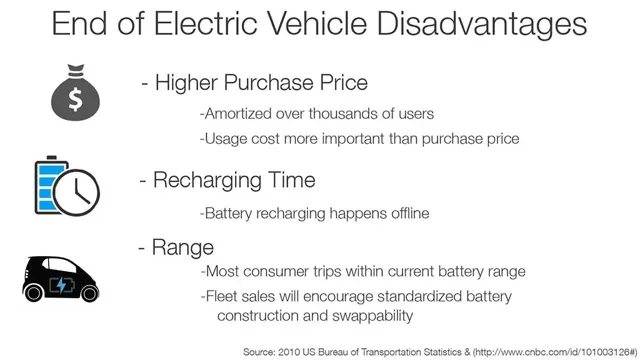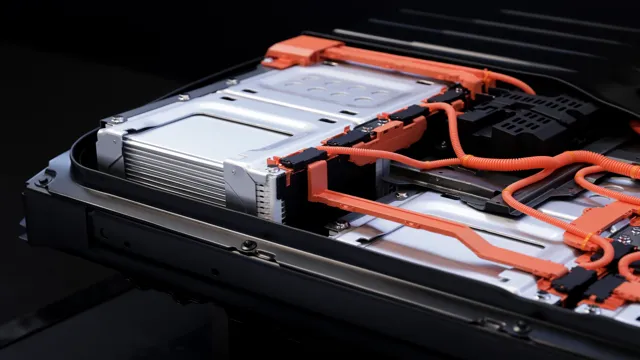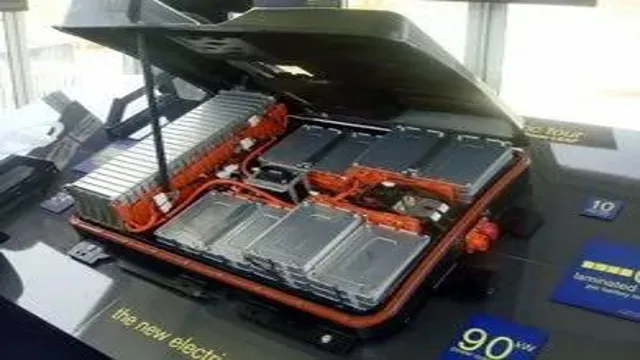Unpacking the Pros and Cons of Electric Car Batteries: Benefits and Drawbacks You Need to Know!
Electric cars have gained immense popularity over the years, and for all the right reasons. With emissions becoming a growing concern, electric cars have emerged as a cleaner and greener alternative that aims to minimize our carbon footprint. One of the most significant components of electric vehicles is the battery.
The battery is responsible for powering the electric motor, thus making it the heart of the car. Electric car batteries offer several advantages over traditional gasoline cars, including lower emissions, lower maintenance costs, and high fuel efficiency. However, there are also a few downsides that car owners should be aware of before making a switch.
In this blog post, we will explore the advantages and disadvantages of electric car batteries and discuss why these batteries are a critical component of electric vehicles.
Advantages:
Electric car batteries offer several advantages over traditional gasoline engines. First and foremost, electric cars are much more environmentally-friendly, emitting zero pollutants into the atmosphere during operation. Additionally, electric cars have lower operating costs than their gas-powered counterparts due to their higher efficiency and lower maintenance requirements.
Electric car batteries also offer the potential for energy independence, as drivers can charge their cars using renewable energy sources like solar panels. Finally, electric cars offer a quieter and smoother ride due to their lack of vibration and engine noise. Despite these advantages, there are also disadvantages to electric car batteries such as limited range and longer charging times.
However, as technology improves and infrastructure for electric cars expands, these disadvantages are likely to become less significant.
1. Eco-Friendly & Efficient
When it comes to eco-friendliness and efficiency, there are several advantages associated with it. Firstly, an eco-friendly approach can significantly reduce the negative impact on the environment. By implementing practices such as recycling, using renewable resources, and reducing wastage, we can reduce the amount of waste that pollutes our planet.
Secondly, eco-friendly practices often translate into higher efficiency. This is because sustainable practices are often designed to optimize resource usage, leading to fewer resources being consumed in the long term. Furthermore, by reducing wastage, we can save on costs associated with raw materials and disposal, resulting in significant cost savings over time.
Overall, adopting an eco-friendly and efficient approach is not only positive for the environment but can also have significant benefits from a business perspective, leading to improved sustainability, resource usage, and cost savings.

2. Low Maintenance Costs
Low Maintenance Costs When it comes to purchasing a new vehicle, one of the most important factors to consider is the cost of maintenance. Thankfully, one of the advantages of owning an electric vehicle is that they typically have lower maintenance costs than traditional gas-powered vehicles. This is because electric vehicles have fewer moving parts and do not require regular oil changes.
Additionally, regenerative braking systems help extend the life of brake pads and other components. This means that electric vehicle owners can save money on routine maintenance and repairs over time. While there may be some initial costs associated with installing a home charging station or replacing an electric vehicle’s battery, overall, the savings in maintenance costs will likely outweigh these expenses in the long run.
Furthermore, as electric vehicle technology continues to advance, we can expect to see even more cost savings in the future. So, if you’re looking for a vehicle that is both environmentally friendly and cost-effective to maintain, an electric vehicle may be the right choice for you.
3. Quick Acceleration & High Torque
When it comes to electric vehicles, quick acceleration and high torque are some of the biggest advantages that set them apart from traditional gasoline-powered cars. Unlike gas cars that take time to warm up and get going, electric cars offer instant torque and acceleration from a dead stop. This means that electric vehicles can go from 0 to 60 mph in a matter of seconds, making them a ton of fun to drive and allowing them to easily merge onto highways and other high-speed roads.
In addition to being fun to drive, electric vehicles with high torque and acceleration can also have practical benefits. For example, they can be ideal for towing heavy loads, climbing steep hills, or navigating tough terrain. So if you want a car that offers both speed and power while also being eco-friendly, an electric vehicle with quick acceleration and high torque might be just the thing you are looking for.
4. Long Lifespan
When considering purchasing any product, one of the most important factors most people consider is how long it will last. When it comes to technological devices, like home automation systems, longevity of performance is crucial. The good news is that home automation systems are designed to have a long lifespan.
This means that once installed, your home automation system will last for years, providing you with the convenience and control you need. A home automation system is built to last, and its long lifespan is definitely a huge advantage. You won’t have to worry about your system breaking down or breaking your budget by having to replace it anytime soon.
With proper maintenance, home automation systems can remain in top condition for many years to come, making it a worthwhile investment for any homeowner. So, if you’re looking for a reliable, long-lasting home automation system that can make your life easier and more convenient, now is the time to invest.
Disadvantages:
When it comes to electric car batteries, they certainly have their advantages, but also a few disadvantages to consider. One major downside is the cost of replacements, as these batteries can be quite expensive to replace compared to traditional gasoline engines. Additionally, the battery must be charged regularly to maintain optimal performance, which can sometimes be inconvenient.
Another disadvantage is the potential for reduced driving range, as extreme temperatures and other factors can impact battery life. However, despite these disadvantages, electric car batteries also bring many benefits, such as improved environmental impact and greater energy efficiency. With proper maintenance and usage, the advantages can far outweigh the disadvantages for many drivers.
1. High Initial Cost
When it comes to installing a solar panel system, one of the main disadvantages is the high initial cost. While the long-term benefits of using renewable energy may outweigh the upfront expenses, it can be a significant investment for some homeowners. The cost of a solar panel system includes not only the panels but also the installation, permits, and other equipment necessary to make it function properly.
However, it’s essential to consider that many solar panel systems come with warranties and a lifespan of up to 25 years, providing a return on investment over time. While the initial cost may seem daunting, it’s important to weigh the long-term financial and environmental benefits of using solar energy. And with the development of financing options such as solar loans and leases, more and more homeowners can afford to make the switch to solar power and enjoy the savings it provides in the long run.
2. Limited Driving Range
One major drawback of electric cars is their limited driving range. Unlike traditional fossil-fuel-powered vehicles, electric cars require charging, which can take anywhere from several hours to an entire day, depending on the type of charging station being used. This means that EV owners must plan their trips accordingly to ensure they don’t run out of battery power mid-drive.
Furthermore, there are still relatively few charging stations available compared to gas stations, making it challenging to go on long road trips with an electric vehicle. While some newer models boast extended ranges of up to 300 miles or more, these vehicles tend to be more expensive. Therefore, if you’re on a tight budget, you may need to compromise on range and settle for a more affordable electric car with shorter range.
Nonetheless, it’s important to note that the availability of charging stations is increasing year by year, so it’s only a matter of time before electric cars become as convenient as their gas-guzzling counterparts.
3. Longer Recharge Time
One of the major drawbacks of electric vehicles is their longer recharge time. Unlike their gasoline counterparts, EVs require much longer to recharge fully. With today’s technology, it can take several hours to recharge an electric vehicle fully, which can be problematic for long-distance travel, where frequent stops for recharging can become an inconvenience.
On the bright side, there are electric vehicle models that can be charged up to 80% in around 30 minutes with fast-charging technology. However, these types of charging stations are still rare and not commonly available. It’s important to keep in mind that EV owners must plan their routes accordingly to ensure they have enough charge to reach their destination or locate the nearest charging point.
Moreover, as battery technology improves, it is likely that the recharge time will decrease, mitigating this disadvantage in the future.
Conclusion:
In conclusion, the electric car battery offers many advantages such as a cleaner and more sustainable source of energy, lower operating costs, and quieter driving experience. However, these advantages are not without their drawbacks, namely range limitations and the cost of replacement. Much like any other technology, the electric car battery presents both opportunities and challenges, and it is up to us to weigh these pros and cons as we move towards a future of more environmentally-friendly cars.
So, whether you prefer to stick with fossil fuels or embrace the electric revolution, one thing is for sure: the power is in your hands.”
FAQs
What are the advantages of electric car batteries compared to traditional gasoline engines?
Electric car batteries are more environmentally friendly, offer quieter operation, require less maintenance, and have the potential for lower fuel costs.
Are there any disadvantages to using electric car batteries?
Yes, there are a few drawbacks, including limited driving range, longer charging times, and higher initial costs compared to gasoline vehicles.
Can electric car batteries be recycled?
Yes, most electric car batteries can be recycled to recover valuable metals and materials.
How long do electric car batteries typically last?
The lifespan of an electric car battery varies depending on factors such as usage, temperature, and charging habits, but most are designed to last at least 100,000 miles or more before needing replacement.



